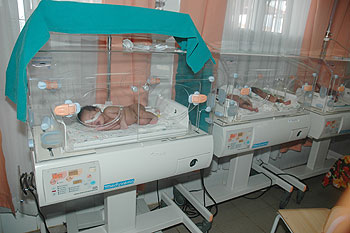The compulsory move by hospitals and health centers to ensure that all mothers go for postnatal checkups ten days after childbirth is something that will save many mothers and babies lives. Most women and babies get several complications after birth and this raises the Neonatal mortality rate and maternal mortality rate. The demographic Health Survey carried out in 2005 indicted that Infant mortality was 86 in every 1000 births while the maternal mortality was 750 out of every 100,000 live births.


The compulsory move by hospitals and health centers to ensure that all mothers go for postnatal checkups ten days after childbirth is something that will save many mothers and babies lives. Most women and babies get several complications after birth and this raises the Neonatal mortality rate and maternal mortality rate. The demographic Health Survey carried out in 2005 indicted that Infant mortality was 86 in every 1000 births while the maternal mortality was 750 out of every 100,000 live births.
Some mothers take postnatal checkups for granted resulting in babies get complications leading to neonatal death.
According to the data complied in 2005 at Muhima Hospital in Nyarugenge District, the total number of deliveries being 9,953, the number of neonatal death was 220.
In 2011, the total number of deliveries was 6472 while neonatal deaths were at 40. This shows that the number of neonatal deaths has reduced due to several factors such as encouraging postnatal checkups and the promotion of safe motherhood in Rwanda.
In an interview with The New Times, Dorothy Bamurange, Head of Nursing at Muhima Hospital, also the Secretary of the Rwanda Midwives Association, explains how postnatal checkups have been of a factor that improved safe motherhood and led to the decline of neonatal death.
"The essence of a postnatal examination is to examine the mother and the baby to see if they both didn’t get any complications after delivery. It is for all mothers regardless of whether they had a cesarean section or normal delivery. It’s more about the follow-up of both the mother and child,” Bamurange explains.
She adds that during the checkups, the child gets immunized while the mothers are advised to start the most applicable family planning method of their choice.
"Muhima Hospital is a District hospital which supervises nine health centers in Nyarugenge District, we therefore receive women who are transferred from health centers especially those with complications,” she explains.
She said: "With normal deliveries the mothers spend at least 12 hours under close observation. When we discover that they are healthy, we discharge them and advise them to go for postnatal care at their health centers that are nearer to their home areas.”
Given the situation at hand, the neonatal mortality rate is reducing because of several factors as well the introduction the Kangaroo Mother-Care for underweight babies, in cases where inadequate incubators are available.
Kangaroo mother-care is a method where a mother of an underweight newborn places the child on her chest between her breasts using a piece of cloth, which fastens the child close to the mother’s heartbeat. It’s for underweight babies who are less than 2.5 kilograms.
According to Joséline Uwimbabazi, a mother who has spent a month at Muhima hospital, the method helps her baby to maintain the right body temperature.
"The method is good because I’m able to closely monitor my child than when it’s in the incubator. When I experience unusual incidents, I inform the nurses immediately,” Uwimbabazi said.
Mothers in the Kangaroo mother-care sections at Muhima hospital, are closely monitored and are discharged when the babies acquire normal body weight.


